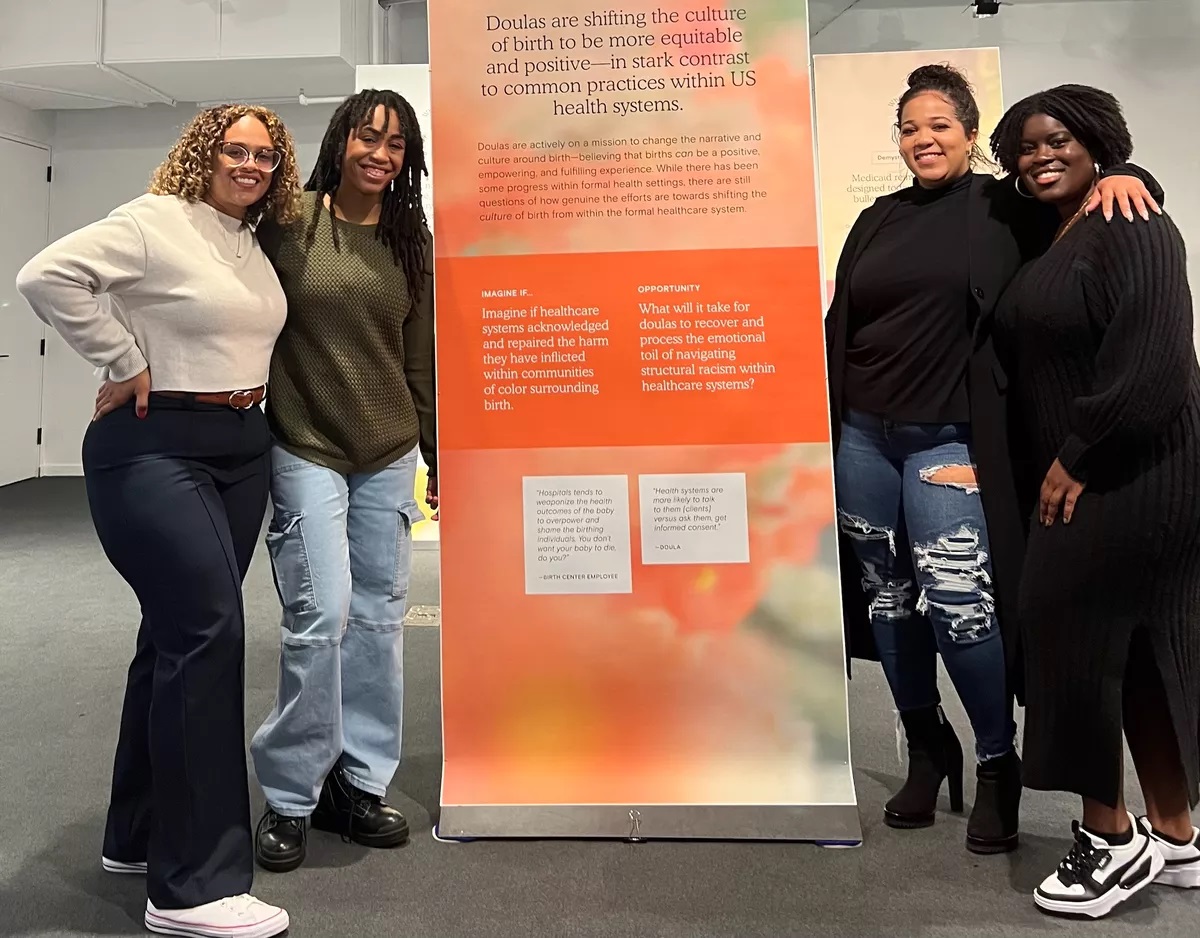👋 Welcome to Starting Early. Every other week, we spotlight new reports, useful news, engaging interviews with people doing important work, and interesting takes on maternal health and early childhood development issues.
The birth of a baby is an exciting time for families. It can also be stressful — as parents navigate health concerns, complex health systems, and advice from family, friends, and perinatal care providers. Community doulas can help calm things down through the tailored care they provide every step of the way.
But, like families welcoming a new addition, doulas need support too.
Working with community doulas over the past 4 years, we see their astonishing impact in the face of unsustainable wages, inadequate reimbursement, and tension from clinical providers. This article in HealthAffairs shares what we’ve learned. In this issue, we examine barriers doulas face and offer solutions.
Read the links and go deeper.
1 big thing: community doulas promote maternal health

Doulas are powerful partners in tackling the maternal health crisis. Community doulas empower families to get high-quality physical, emotional, and informational support before, during, and just after birth. They serve the community they come from, providing holistic, culturally-congruent care.
Doulas reduce maternal health disparities. The US has poor maternal health compared to other high-income countries – especially for mothers of color, who have higher rates of maternal mortality and morbidity than white mothers. Doula-supported births are associated with such benefits as increased breastfeeding rates, decreased likelihood of medical interventions, and increased patient satisfaction. Greater use of doula services can improve maternal health in the US, particularly for women of color, those who struggle to make ends meet, and other communities at high risk for poor health.
- By the numbers: The AMAR Community Doula Program at the Children’s Home Society of New Jersey, which serves Spanish-speaking families in Trenton, NJ, has contributed to a 77.4% reduction in preterm births and a 83% reduction in low birthweight births, and trained 23 bilingual community doulas.
Doulas reduce high maternal health costs. Pregnancy-related health conditions harm the wellbeing of mothers and infants, costing the US an estimated $30 billion a year in increased medical spending, decreased economic productivity, and greater need for social assistance. The healthcare expenses for a premature or low-birth weight baby average $55,393 through the first year of life, compared to $5,085 for full-term babies.
- By the numbers: A study of over 65,000 Medicaid births estimates that doula care is associated with savings of $58.4 million from decreased preterm and caesarean birth rates.
Doulas bring diversity to the maternal workforce. Patients cared for by people sharing the same cultural background and similar lived experiences, have better health and healthcare experiences. Unfortunately for patients of color, finding a maternal care provider of the same race, culture, ethnicity, or language can be difficult. Most of the maternal health workforce – 61.8% of maternal health physicians and 73.3% of maternal health nurses – is white, but almost half of US births are to women of color.
- Community of Caring: The Paterson Doula Cooperative at the Partnership for Maternal and Child Health of Northern New Jersey helps families obtain maternal care that reflects their culture and lived experiences. In its first year, the Cooperative provided doula services to a small group of Paterson residents and will expand to more families in the coming year. The Cooperative’s first group of doulas consisted of 13 trainees who speak 9 languages: Arabic, Bengali, English, Greek, Hebrew, Hindu, Spanish, Urdu, and American Sign Language. 🌍
2. Understanding the doula workforce’s needs

In the Burke Foundation’s work to expand and diversify New Jersey’s doula workforce, we see how community doulas improve the health of New Jersey babies, mothers, and families. New Jersey approved Medicaid coverage of community doula services in 2019. Despite this momentum, they are underpaid and undervalued.
To improve doulas’ economic security, we’re launching a groundbreaking effort to create sustainable job opportunities for community doulas — working in partnership with them. With the Greater Newark Health Care Coalition and the Henry & Marilyn Taub Foundation, we’re partnering with IDEO.org to address the challenges New Jersey’s community doulas face as well as their needs and aspirations. The team has conducted around 50 conversations — through 1-on-1 interviews and co-creation workshops — with doulas, community doulas and pregnant women in Camden, Trenton, Paterson and Newark. Here are some of their insights.
- Community doulas do more than “doula-ing.” In addition to providing perinatal support, community doulas fill gaps in the healthcare system by connecting clients to crucial resources and providing trauma-informed, relationship-based, equity-centered care. Community doulas also help clients navigate burdensome health and social services systems.
Invisible work: When one of her clients became homeless, IDEO Community Doula Researcher Cassie Angu helped her obtain government resources and locate temporary housing.
More effort needed to integrate doulas into the maternal care team. Despite efforts to increase access to doula services, many people — including perinatal healthcare workers — don’t know what doulas are or do. Misconceptions about doulas and confusion over their role can make it difficult for doulas to collaborate with healthcare providers. The doula researchers are interested in strengthening provider-doula relationships. A study of maternal care providers’ perceptions of doulas finds that many providers value the support doulas offer and their strong relationship with patients, but others have negative perceptions. Hospital culture can influence providers’ opinions of doulas by educating staff on the doula model of care and strengthening provider-doula relationships.
Getting stable compensation is crucial. Community doula services are often offered at low or no cost to clients. So, who pays the doulas? A survey of 98 community doula programs across the country found that 70% were funded through private grant foundations and fewer than 5% through Medicaid. Wherever the funding comes from, many community doulas find the administrative burden a barrier to getting reimbursed. Over-relying on a single source of funding can threaten sustainability. An increasing number of states are paying for doula services through Medicaid, Title V MCH Block Grants, and other governmental programs. But Medicaid reimbursement alone isn’t enough.
Driving systems change: The team of doula researchers and health, policy, higher education, parent, and community leaders will design the birthing workforce of the future and share new models in early 2023.
— Community Doula Researcher Cassie Angu on her hopes for the work.
3. One smile to go: Innovative doula work😃
Across the country, organizations provide doula services to meet the needs of underserved communities and reduce health disparities. We profile 2 initiatives:
Support for mothers with substance use disorder: Substance use during pregnancy affects over 20,000 births a year. Drug and alcohol use while pregnant is associated with such complications as low birthweight, stillbirth, and maternal mortality, and can lead to long-term health problems. Mothers dealing with substance use disorder report fear of being judged or reported by healthcare providers. This leads many to avoid care.
- A pilot program of the Illinois Department of Human Services helps pregnant and postpartum women with opioid use disorder, including use of a Doula Certified Peer Recovery Specialist – a person in active recovery and certified as a doula. These doulas support mothers through the perinatal period and recovery.
Supporting pregnant incarcerated people: The Pregnancy in Prison Statistics study estimates about 58,000 pregnant women a year are admitted to US jails and prisons – many of which lack maternal health services. This is especially problematic because incarcerated people are more likely to suffer from mental health issues, substance use disorders, and other conditions that threaten pregnancy outcomes. Women who give birth while incarcerated can also be subject to poor treatment, including shackling to and from medical facilities and being chained to hospital beds during labor and delivery.
- The Minnesota Prison Doula Project offers doula services, group education and support groups, individual peer counseling, and other resources. Prison doulas advocate for incarcerated people and can help prevent traumatic birthing experiences.
4. The roundup
Learn about upcoming events, new funding opportunities, and jobs in maternal and infant health and early childhood:
- Expanding access to high-quality maternal care: The Institute for Medicaid Innovation and Every Mother Counts will host an 8-part webinar series on the value of integrating community doula and perinatal community health worker services in Medicaid, starting December 1. Register here.
- Bolstering the perinatal workforce: The New Jersey Perinatal Community Health Worker Training is a statewide initiative training maternal and child health advocates to become community health workers and doulas. Apply by December 2 to join the newest cohort.
- A nationwide movement: In its latest issue brief, the National Health Law program tracks efforts to implement doula Medicaid coverage. As of November, 8 states and Washington DC cover doula services through Medicaid and other states are making strides to do so.
- Analyzing the maternal health crisis: The Commonwealth Fund examines the factors contributing to poor US maternal health in a new 6-part podcast series, Uncared For.
- Walmart announces plans to expand doula benefit: In 4 states, the retailer covers up to $1,000 for doula services to employees on a Walmart medical plan.
